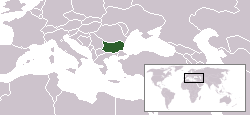| Localization | |
 | |
| Flag | |
 | |
| Basic information | |
| capital | Sofia |
| Government | Republic |
| Currency | lev (BGN) |
| Area | 110,910 km² |
| Population | 7.621.337 (2002) |
| Language | Bulgarian |
| Religion | Orthodox Christians, Muslims, Catholic minorities, Protestants and others |
| Electricity | 220V/50Hz (European socket) |
| Internet TLD | .bg |
| Time zone | UTC 2 |
THE Bulgaria is a country of Balkans. Located in the southeast of the European continent, it borders the Black Sea and borders the Romania, a Serbia, a Greece and the Turkey
Regions

| Northwest door to the West, where the capital is, Sofia |
| South-west mountainous area, with many resorts for winter sports |
| Thrace plains dominated by the River Maritsa and tributaries, with many remnants of ancient Thrace; it is also where the second largest city in the country is located, Plovdiv |
| Black Sea coast with the port cities of Varna and boules |
| North center cities like Lovech and Rousse, the Danube river and forests |
Cities
- Sofia - the capital of the country
- Veliko Tarnovo - former capital in the mountains of the north of the country
- Plovdiv - Bulgaria's second largest city is one of the oldest in the Europe
Other destinations
Understand
To arrive
Brazilians and European Union citizens do not need a visa for visits of up to 90 days every 6 months, a valid passport is enough.
- Embassy of the Republic of Bulgaria - SEN - Quadra 801, lot 8 - CEP: 70432-900 - Brasília - DF. Tel: (61) 3223-6193/3223-9849 (fax:(61)3323-3285; [email protected]). From Monday to Friday, from - 10:30 am to 12:30 pm
By airplane
There are four international airports in Bulgaria, in the cities of Sofia, Plovdiv, Varna and boules. Low-cost airlines like Wizzair or Sky Europe have recently started to offer frequent flights from other parts of Europe.
Of boat
On the Black Sea coast, the ports of Varna (which receives passenger lines from Novorossiysk and Odessa) and Burgas are the most used. On the Danube, Ruse is a big port, while lom serves the capital Sofia.
By car
To enter the country, an international license is required, the gray letter and the green card insurance policy for Bulgaria. Although many signs are already being placed in Latin alphabet, for the purposes of orientation and reading of traffic signs, it is important to have at least notions of the Cyrillic alphabet.
By bus/bus
There are Bulgarian companies operating abroad, and although they are usually cheaper, they are less comfortable and it can be difficult to find places to buy tickets. The Eurolines company serves the country. Most buses from Western Europe pass through Serbia, so make sure you have the necessary visa for transit through Serbia.
It is common for the driver to charge a "border tax" to each passenger - it speeds up crossing the border.
By train/train
The country - especially the cities of Sofia and Varna - is served by several international lines from cities like Kiev, Istanbul, Vienna and Munich.
In between Bucharest and Sofia the trains run twice a day - one daytime (11:35-21:30) and one night (7:35 - 6:10). Schedules can change, check before you definitely plan. Customs and immigration control take place in the town of Ruse, approximately midway.
Circular
By airplane
Of boat
By car
By bus/bus
By train/train
- The website of Bulgarian State Railways it has timetables and prices for domestic tickets. Site in English and Bulgarian.
Speak
The language spoken in the country is Bulgarian, a Slavic language of the family of russian and of Serbian, and which uses the Cyrillic alphabet, invented by Bulgarian monks.
have a conversation guide can be useful as the language can be tricky to learn for Portuguese speakers and speakers of a second language in Bulgaria are not the majority. Among these, German and Russian are the most widely used languages, while the use of English is growing slowly among the youngest.
Buy
Although Bulgaria is expected to join the European Union in 2007, there is no immediate prospect of adopting the Euro as its currency and the country will continue to use the take.
In November 2006, 1 lev equals approximately:
- BRL 1.45
- EURO 0.51
Prices in Bulgaria are relatively cheaper than in Western Europe. Worthwhile items:
- Embroidery and ceramics
- Icons and other religious items
- Cheeses, honey, yogurt, spices, sausages
- wines, rakia
- Clothes, shoes and other leather items can also be available for a good price.
With the
Where
Some of the traditional "Mekhana" restaurants are interesting places to visit, offering traditional/folk music and orchestras.
What
Bulgarian cuisine is, in many ways, similar to the kitchen greek and the turkish, with heavy meats and broths, but also many salads.
Traditional bakeries prepare the banisha (cheese puff) and the mekitsa.
Yogurt is also a very common ingredient used in preparing salads such as mletchna, soups like the tarator and the popular drink ayrian, slightly salty.
Cheeses like siren (goat or sheep, similar to feta Greek) or the kashkaval are also popular.
drink and go out
sleep
Learn
Work
Safety
Health
respect
Stay in touch
| This article is outlined and need more content. It already follows a suitable model but does not contain enough information. Plunge forward and help it grow ! |

